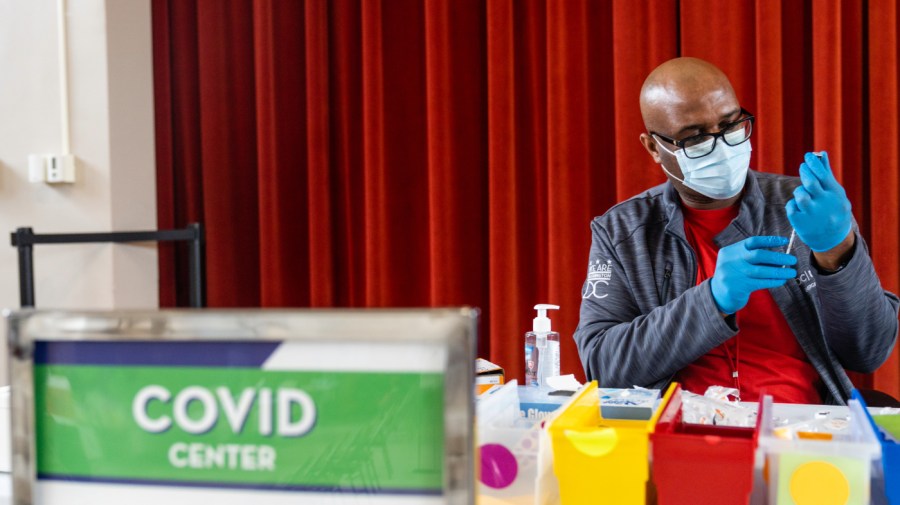The House Select Subcommittee on the Coronavirus Pandemic released its final report Monday, laying out numerous conclusions from its review of the federal pandemic response, including what the Republican-controlled panel believes to be the likely origins of the virus.
The 520-page document encompassed a wide range of issues relating to the pandemic including vaccinations, public health guidance, state-level actions and use of relief funds.
“Since February 2023, the Select Subcommittee sought to produce a full after-action report to provide a road map of how we, in Congress, the Executive, and the private sector may better prepare for and respond to future pandemics,” subcommittee Chair Brad Wenstrup (R-Ohio) said in a letter.
“Throughout this process, the Select Subcommittee sent more than 100 investigative letters, conducted 38 transcribed interviews or depositions, held 25 hearings or meetings, and reviewed more than one million pages of documents from of custodians,” he noted.
The subcommittee’s hearings were often marked by contentious back-and-forth between members and witnesses. Several interviews were held behind closed doors, including two days of interviews with Anthony Fauci, former director of the National Institute of Allergy and Infectious Diseases, earlier this year.
Wenstrup listed seven specific findings in his letter, including that the National Institutes of Health funded controversial gain-of-function research at the Wuhan Institute of Virology, Operation Warp Speed was “tremendous success” and the public school closures will have an “enduring impact” on American children.
Here are three takeaways from the report:
Lab leak theory
The report starts with the finding that the SARS-CoV-2 virus “likely emerged because of a laboratory or research related accident.”
This finding was supported by remarks from people like Robert Redfield, the former director of the Centers for Disease Control and Prevention (CDC), former Director of National Intelligence John Ratcliffe and former U.K. Prime Minister Boris Johnson, all of whom publicly stated their support for the lab leak theory.
“Based on my initial analysis of the data, I came to believe — and still believe today — that it indicates COVID-19 infections more likely were the result of an accidental lab leak than the result of a natural spillover event,” Redfield is quoted as saying.
The report also found Fauci “prompted” the 2020 study titled “The proximal origin of SARS-CoV-2,” which supported the natural origins theory, to “disprove” the lab leak theory.
When he testified before the committee in June, Fauci reiterated that he did not edit the study or help to “suppress” the lab leak theory.
Different federal agencies have drawn different conclusions about the most likely origin of the virus, but it remains a mystery.
Mitigation efforts
The report is critical of many of the mitigation measures that were employed early on in the pandemic.
It found that masks and mask mandates were “ineffective at controlling the spread of COVID-19.” Several studies, including one published this August, have found masking in public has an effect on lowering respiratory viral transmission, though this should not be the sole measure used to mitigate spread.
Further, the report concluded lockdowns caused “more harm than good” to the economy, overall health of Americans and development of children.
The 6-foot social distancing guidance was also blasted as not being “supported by science.”
“Even though it was CDC guidance and not a mandate, it was forcefully implemented by state and local governments and caused lots of strife amongst Americans,” the report states.
However, there were some measures that the subcommittee found to have had some benefit or merit.
The public-private partnerships that were made to enable widespread COVID-19 testing early on in the pandemic allowed for “readily available and accurate tests,” though COVID-19 testing was called “flawed” in the report.
Travel restrictions were also cited as having saved lives.
“With four years of hindsight, it is clear the international travel restrictions early in the pandemic delayed spread of the virus but did not prevent COVID-19 from entering the U.S.,” states the report.
EcoHealth probes
The subcommittee’s report paid particular attention to the actions of EcoHealth Alliance, the nongovernmental organization that sub-awarded NIH grants to global labs including the Wuhan Institute of Virology.
Echoing criticism from members of the subcommittee, the report found EcoHealth failed to carry out proper oversight of the experiments it provided funding for, facilitated gain-of-function research and misled the NIH on the details of its research projects.
The NIH in turn also was found to have failed in its oversight of EcoHealth.
The report found that the Justice Department had empaneled a criminal grand jury to investigate the origins of COVID-19.
“EcoHealth was subject to numerous federal investigations regarding both its potential role in the COVID-19 pandemic, but also multiple accusations surrounding violated federal grant policies. The outcomes of most of these investigations are public,” it states.
“However, the Select Subcommittee discovered that DOJ was also investigating the origins of COVID-19,” it continued. “The specific details of the investigation are unknown but, based on documents, it appears the DOJ’s investigation involves EcoHealth’s role in the COVID-19 pandemic.”
The report says the results of the DOJ’s investigation are not public as of “December 4, 2024,” when the subcommittee plans to mark up the report.

